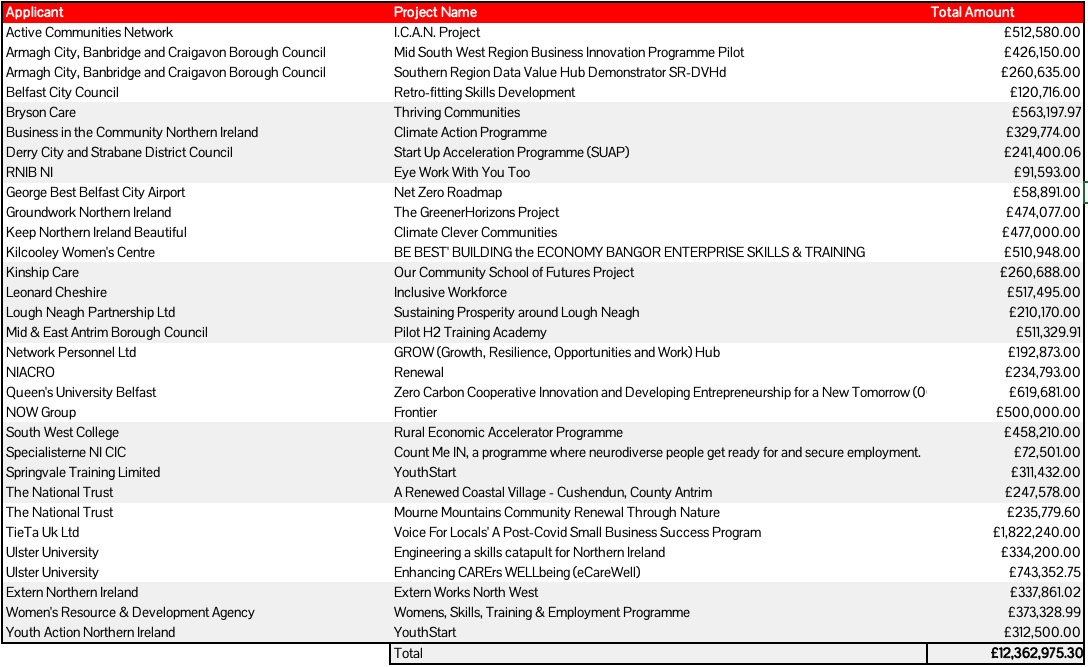UK Community Renewal Funding - How Does NI Compare?
In the absence of EU Funds, the UK created the interim £220m UK Community Renewal Fund. NI was awarded £12.4m across 31 projects on 3rd November 2021 as outlined below
List of Projects in NI awarded UK Community Renewal Funding (03Nov21)
UK Community Renewal Funding Per Capita Breakdown
On a per capita level NI achieved double the UK average with a per capita spend of £6.52 (v £3.03 UK). Whilst triple the English spend (£2.22) it was still less than half the Welsh rate of £14.78.
UK Community Renewal Fund (Per Capita Spending Breakdown)
Welsh strategy, if there was one, appears to have been going for volume of bids and also submitting slightly smaller bids on avaerage. They submitted 165 bids, one for every ~19,000 people against a UK average of 1 per 141,000 (NI 1 per 61,000). They also had the smallest bid of £6,630, with NI’s smallest bid at £58,891. Over double the value of the next smallest from outside NI (Scotland, £25,000).
A New Era for NI Funding
The CRF funding follows in the footsteps of the Levelling Up Fund and the City/Growth Deals. All three being sought from and approved in London. This means going up against the rest of the UK; and is party why UK departments are beginning to base themselves in NI. Funding has always been political to some degree, and there is an element of this with the UK funds. However they do represent a fundamental shift in several ways for NI. Bids in NI are treated differently to the rest of the UK:
Firstly, they aren’t as tied as much to MPs (there are no Conservative MPs in NI, nor likely to be).
Secondly, they are not tied to Councils, but open to a much wider audience.
“Out of 31 successful bids from NI, only 5 came from Councils. In terms of actual funding, Councils received one-eight of the total amount going to NI. Compare this to the rest of the UK, where all 446 bids came from local authorities/councils”
Breakdown of CRF funding in NI by successful applicant
Thirdly, funds are not limited to non-profits. The Levelling Up Fund was open to businesses.
Fourthly, they are increasingly being linked to business-case like applications, i.e. the new UK five case model outline business case. By effectively completing a business case style application, this makes it much easier to substantiate value for money. It also makes it much quicker by negating the need for a business case on applications after they’ve been submitted (as was traditionally the case in NI with many EU Funds)
Finally, they appear to focus much more on deliverability and outcomes. Land ownership, planning permissions etc usually have to be completed and there has to be an experienced (which often means large organisation) group behind it. Further, there has normally to be relevant community support - this is to ensure support on the ground; which again adds to deliverability. There will be fewer funds going unspent; which means less admin and heartache for funders - who being given money don’t want to see it going unspent.
So What Does This Mean?
These trends are likely to stay. Many non-profits have always sought money from UK wide funders (e.g. the National Lottery), with many seeking UK Trust & Foundations. Who have always adopted a slightly different approach - more objective, supportive, understanding and multi-year perspective but one also pushing on deliverability. There was always a sense that NI was under-represented at this level, with many groups having a ‘fear of the uncertain’. However, the larger more progressive non-profits in NI have been looking for UK funding for several years now, aware of the decline in EU funding. With their experience, aims and scale they can compete with the best and realise it is often much advantages over declining NI public funds, which are often more short-term and require significantly more administration.
Whilst many non-profits and businesses will increasingly look in UK, smaller non-profits may need to readjust their outlook - and be prepared to look beyond traditional funder reliance (which is often misplaced). NI Departments will not like being left out of the loop (for now), but the UK departments appear here to stay. NI should take a quick look at Wales, who’ve been seeking significant UK wide funding; NI is doing well but we can do better and bigger. Bring it on, and keep looking out for UK wide opportunities.




